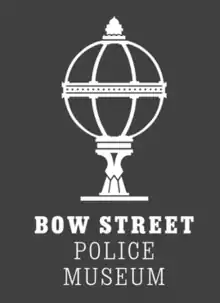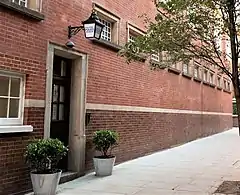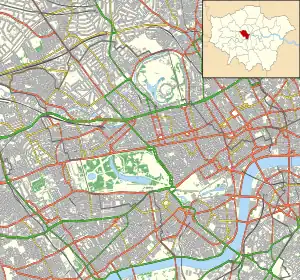Bow Street Police Museum
The Bow Street Police Museum, opened in 2021, is based in the former police station in Covent Garden, London. Bow Street has a unique place in the history of policing in London, with the museum presenting the story of policing and criminal justice in the area from the eighteenth century until 1992, when the police station closed.
 | |
 Entrance in Martlett Court, Bow St | |
 Location within City of Westminster | |
| Established | May 2021 |
|---|---|
| Location | Covent Garden London, WC2E 7AW |
| Coordinates | 51°30′49″N 00°07′18″W |
| Type | Police museum |
| Public transit access | |
| Website | Official website |
.jpg.webp)
The current museum of this name is not to be confused with the Metropolitan Police's own small public display of historic artefacts which occupied four galleries and five other rooms on the third floor of Bow Street Police Station from 1949 until the 1980s, then in West Brompton and now Sidcup - a cutlass, rattle and other objects from that collection are on loan to the Bow Street Police Museum.[1]
Background
The first court in Bow Street was established in 1740, and in 1749 the magistrate recruited several constables. This group became the first effective police force in London, soon known as the Bow Street Runners.[2] Soon after the Metropolitan Police was established in 1829, a station house was sited in Bow Street, with the current building completed in 1881 housing both the police station and a Magistrates' Court.[3] The police station closed in 1992 and the court in 2006, when the building was sold to developers.[4] Planning permission was obtained to convert the building, which is grade II listed, into a hotel and police museum,[5][6] both of which opened in May 2021.[7]
Museum
The museum operates as an independent charity, with initial funding provided by the Sydell Group that own the building, which also houses a hotel.[8] The museum plans to host regular events, and discussions on issues related to modern policing and social justice.[8]
The museum galleries are situated in the cells and offices of the former Bow Street Police Station. It presents the history of policing in the area from the mid-eighteenth century to the closure of the police station in 1992. This includes the experiences of police officers, and of prisoners detained there pending appearance in the neighbouring Magistrates' Court. Exhibits include an original court dock, equipment used by the Bow Street Runners, and personal effects of former officers, including beat books and truncheons. Visitors can enter a large cell called 'the tank', once used to detain overnight those arrested for drunken behaviour in Covent Garden.[8][9][10]
Famous prisoners depicted include Oscar Wilde, Dr Crippen and the Kray twins, and those facing extradition proceedings, such as Augusto Pinochet and James Earl Ray.[11] Some of these figures are shown in reproductions of courtroom sketches by William Hartley from the collections of the Metropolitan Police's Crime Museum.[12]
Shortly before the museum opened in May 2021, its curator Jen Kavanagh said "We hope that when visitors walk through the doors of the museum, they will have a real sense of the history of Bow Street and the people who have passed through those doors before them. We have worked especially closely with officers who served at Bow Street and, as a result, the museum is rich with recollections of life at a unique place in a special part of town."[10]
Transport links
The building housing the museum is opposite the front of the Royal Opera House, and is within walking distance from both Covent Garden Underground station and Charing Cross railway station.
See also
References
- "Londoners get first look at police museum". Evening Standard. 22 June 2009. Retrieved 16 June 2021.
- White, Jerry (2007). London in the 19th Century. London: Vintage. p. 383. ISBN 9781847924476.
- "London's Bow Street Police Station to be turned into museum". BBC News. 11 July 2006. Retrieved 14 June 2021.
- "Historic court sold to developers". BBC News. 2 August 2005. Retrieved 14 June 2021.
- RISE Management, Consulting news (2015). "Appointment of construction manager for conversion of Bow Street Magistrates Court into luxury Boutique Hotel". Archived from the original on 6 May 2015. Retrieved 15 June 2021. (Access date 14 June 2021)
- "Bow Street Magistrates' Court and Police Station listing". Historic England. 30 July 2001. Retrieved 14 June 2021.
- O’Flaherty, Mark (28 May 2021). "London's most famous courtroom is now the capital's hottest hotel". The Daily Telegraph. Retrieved 14 June 2021.
- Brown, Mark (18 December 2020). "Bow Street 'drunk tank' set for sober appraisal as police museum opens". The Guardian. Retrieved 14 June 2021.
- Simpson, Craig (18 December 2020). "Police station that held Dr Crippen and Oscar Wilde to become museum". The Daily Telegraph. Retrieved 14 June 2021.
- "London's Bow Street Police Station to be turned into museum". BBC News. 18 December 2020. Retrieved 14 June 2021.
- Brown, Mark (27 May 2021). "Not like I remember it': Bow Street police station reopens as museum". The Guardian. Retrieved 14 June 2021.
- "Keith Skinner and Alan Moss, Faces in Court 1893-1918: Drawings of William Hartley from New Scotland Yard's Crime Museum". 24 April 2013. Retrieved 18 January 2022.